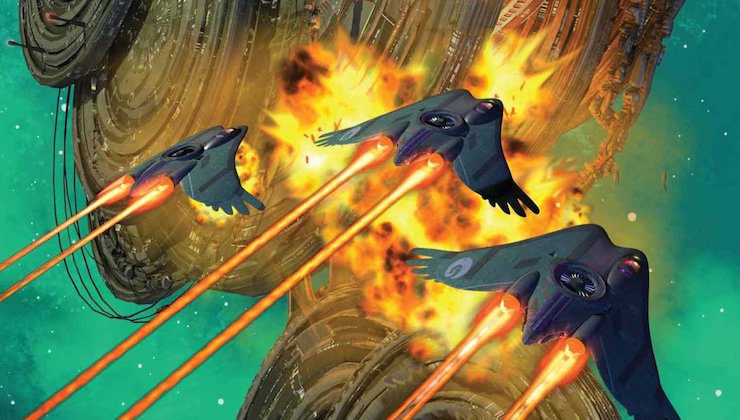When I set out to write this piece, I had a grand vision for what I was going to say. Then I realised that in order to achieve that vision, I’d need to write myself a book’s worth of words. So instead of having an incisive and cutting post looking at approaches to imperialism and gender in space opera, you’re getting the shorter version: a sketch towards an argument comparing the space opera novels of Ann Leckie, Yoon Ha Lee, David Drake, and David Weber, and how they treat empire.
Pretty much just empire. In brief.
Let’s begin with Weber, and with Weber’s well-known Honor Harrington series. Weber’s political worldbuilding intentionally recalls the French Revolutionary wars, albeit with several other more recent influences. All the major powers of Weber’s universe are essentially colonial or imperial ones, either by conquest (the Republic of Haven, later the People’s Republic of Haven), or by a combination of conquest and negotiation (the Star Kingdom of Manticore).
Manticore operates a colonial protectorate over two non-technologically-advanced non-human intelligent species. These are the only intelligent aliens that are ever really mentioned—no alien species has space travel—and both the Medusans, who inhabit a world that is strategically important for control of merchant travel in that region of space (and whose name for themselves we never know), and the treecats, the indigenous inhabitants of Sphinx, a human-colonised world within the Manticore system, recall certain Victorian stereotypes of native populations.
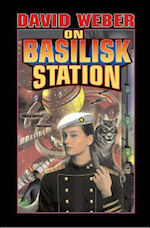 We first encounter the Medusans in On Basilisk Station, when some of them are manipulated by agents of Haven (and provided with drugs and more advanced weaponry) into attacking the “good” Manticoran colonial administration: they are portrayed as naive, easily manipulated, and savagely ungrateful. None of them have a direct voice in any part of the narrative. Meanwhile, the treecats of Sphinx are represented by Nimitz, who has bonded to Honor and is her constant—but unspeaking—companion. Treecats, we later learn, are extremely intelligent and have been shamming less intelligence as a species in order to learn more about humans over the course of centuries. But even with this revelation, they are still portrayed as somewhat childlike and in need of human help in navigating a technological universe.
We first encounter the Medusans in On Basilisk Station, when some of them are manipulated by agents of Haven (and provided with drugs and more advanced weaponry) into attacking the “good” Manticoran colonial administration: they are portrayed as naive, easily manipulated, and savagely ungrateful. None of them have a direct voice in any part of the narrative. Meanwhile, the treecats of Sphinx are represented by Nimitz, who has bonded to Honor and is her constant—but unspeaking—companion. Treecats, we later learn, are extremely intelligent and have been shamming less intelligence as a species in order to learn more about humans over the course of centuries. But even with this revelation, they are still portrayed as somewhat childlike and in need of human help in navigating a technological universe.
Weber’s approach to issues of colonialism and the problems of imperialism is unexamined, uncritically replicating colonial attitudes and dismissing as naive the idea of giving, for example, the Medusans a real voice in their own affairs. He is fundamentally not interested in engaging with issues of power from this angle. His interest is not in interrogating power structures or investigating social possibilities—while the major polities all operate with what appears to be an egalitarian approach to gender, the standard relationship paradigms appear to be mostly-monogamous and heterosexual, except where polygamy (not polyamory or polyandry) is depicted, and genderqueer or transgender characters do not appear to exist at all –but in military action.
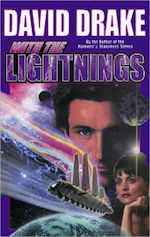 David Drake’s RCN series (With the Lightnings and sequels, the most recent of which is Death’s Bright Day) is also primarily interested in military action. But Drake is rather more interested than Weber in depicting a society (or societies) that is markedly different from modern America in their mores and morals. The Republic of Cinnabar, from whence the protagonists come, owes something to 18th century England. But it owes far more to the height of the Roman Republic, a polity based on the personal connections of patronage and on unapologetic imperialism.
David Drake’s RCN series (With the Lightnings and sequels, the most recent of which is Death’s Bright Day) is also primarily interested in military action. But Drake is rather more interested than Weber in depicting a society (or societies) that is markedly different from modern America in their mores and morals. The Republic of Cinnabar, from whence the protagonists come, owes something to 18th century England. But it owes far more to the height of the Roman Republic, a polity based on the personal connections of patronage and on unapologetic imperialism.
There are no intelligent aliens here.* There are, though, plenty of humans in various different configurations of “civilisation.” Drake is good at acknowledging the hypocrisy of that civilisation’s moral claims: he depicts acts and ways of being without allowing the narrative to uncritically endorse them. There may be better and worse ways of being an imperial power, but—in my reading, at least—the narrative is unconvinced that any of those ways are good. Perhaps unavoidable, but not good.
Drake is one step further down the continuum from Weber in being interested in what “civilisation” (and power) means to people who interact with it (and use it) without necessarily being part of it. Ann Leckie and Yoon Ha Lee are further down in being as (or more) interested in the position of subjects within imperial systems of domination as they are in military adventures.
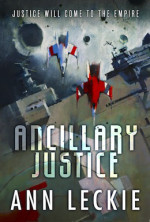 Ann Leckie has to date published three novels and a selection of shorter work, but already many thousands of words has been devoted to discussing her Imperial Radch trilogy, and its approach to empire. Yoon Ha Lee, on the other hand, will see his second novel, Raven Stratagem, come out in June, while his first, Ninefox Gambit, is rolling onto a number of award lists. I want to discuss Leckie’s work and Lee’s in tandem, for while they write very different novels, in their currently published ones, they both possess similar thematic interests. Their main characters negotiate questions of identity, of positionality within systems of domination, and of the problems of communication and trust in contexts where the characters hold power to hurt other people by virtue of their respective social positions. While both Leckie’s work, and Lee’s, involves military action, the military action is not the focus of either one’s novels. Instead, the focus rests on the deformations of power and the intersections of oppression: on power and personhood, empathy and agency, and who gets to enjoy any of these things.
Ann Leckie has to date published three novels and a selection of shorter work, but already many thousands of words has been devoted to discussing her Imperial Radch trilogy, and its approach to empire. Yoon Ha Lee, on the other hand, will see his second novel, Raven Stratagem, come out in June, while his first, Ninefox Gambit, is rolling onto a number of award lists. I want to discuss Leckie’s work and Lee’s in tandem, for while they write very different novels, in their currently published ones, they both possess similar thematic interests. Their main characters negotiate questions of identity, of positionality within systems of domination, and of the problems of communication and trust in contexts where the characters hold power to hurt other people by virtue of their respective social positions. While both Leckie’s work, and Lee’s, involves military action, the military action is not the focus of either one’s novels. Instead, the focus rests on the deformations of power and the intersections of oppression: on power and personhood, empathy and agency, and who gets to enjoy any of these things.
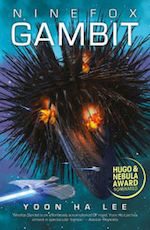 It is this focus on the imperial subject—subject in both senses, the grammatical subject not the object, as well as subject as in one who is subject to—that makes Leckie’s Imperial Radch trilogy and Lee’s Machineries of Empire more interesting, more relatable, and in some senses more real that Weber’s Honor Harrington series. In Weber’s series, the narrative can take a view that presents itself as objective on the actions of the characters and the world-systems it portrays: it is not so interested in exploring the ways in which people negotiate imperial (or post-imperial) systems in which they are trapped, or in casting a revolutionary eye on problems that are analogous to ones we experience today.
It is this focus on the imperial subject—subject in both senses, the grammatical subject not the object, as well as subject as in one who is subject to—that makes Leckie’s Imperial Radch trilogy and Lee’s Machineries of Empire more interesting, more relatable, and in some senses more real that Weber’s Honor Harrington series. In Weber’s series, the narrative can take a view that presents itself as objective on the actions of the characters and the world-systems it portrays: it is not so interested in exploring the ways in which people negotiate imperial (or post-imperial) systems in which they are trapped, or in casting a revolutionary eye on problems that are analogous to ones we experience today.
But Drake demonstrates that one can use military space opera to look at empire with a clear-eyed view. And Leckie and Lee prove that one can use space opera to examine empire in really quite revolutionary ways.
Most of the time, I’m in it for the revolution.
Correction 05-18-17: There are no intelligent aliens whose societies are depicted.
Top image: Raven Stratagem cover art by Chris Moore.
Liz Bourke is a cranky queer person who reads books. She holds a Ph.D in Classics from Trinity College, Dublin. Find her at her blog, where she’s been known to talk about even more books thanks to her Patreon supporters. Or find her at her Twitter. She supports the work of the Irish Refugee Council and the Abortion Rights Campaign.










